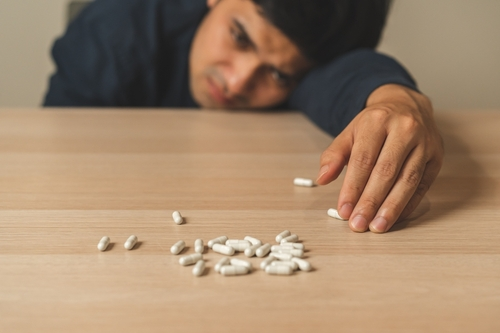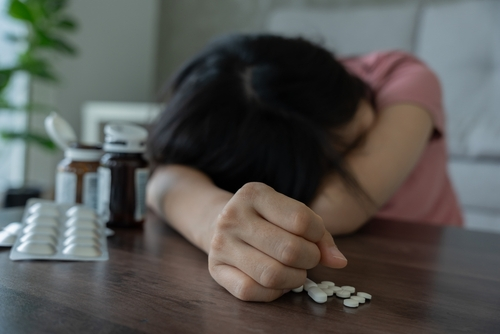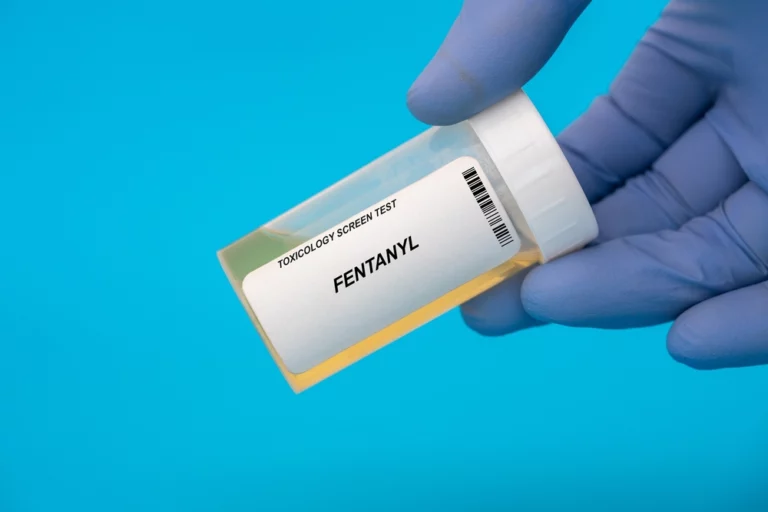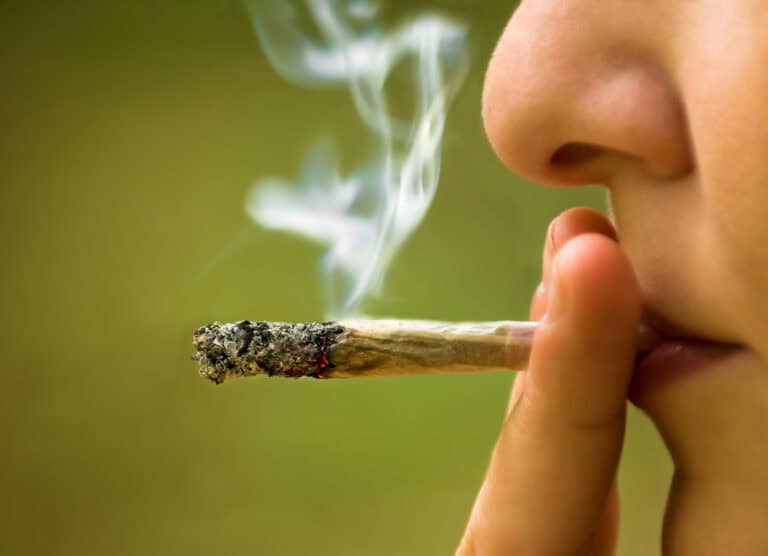Roxicodone, a potent opioid pain reliever, is a vital tool for managing pain, yet its potential for abuse and addiction has led to a growing public health concern. As the popularity of Roxicodone abuse has grown, the slang term ‘Roxies’ has emerged, causing the potential dangers of Roxicodone abuse to become overlooked.
This article will answer the question, “What are Roxies?” We will do this by examining the relationship between oxycodone and Roxicodone, the effects of each medication, the signs someone may be addicted to Roxicodone, and how to treat a Roxicodone addiction.
What is an Oxycodone Addiction?
Oxycodone, a powerful opioid painkiller, is prescribed to treat moderate to severe pain from surgery, injuries, or chronic pain. However, due to its addictive nature, oxycodone addiction is a growing problem in healthcare. While it can provide effective pain relief, its addictive nature has significantly increased cases of addiction and overdoses.
According to the National Survey on Drug Use and Health, in 2021, 8.7 million individuals misused prescription pain relievers, with 2.6 million individuals specifically misusing oxycodone products. This showcases the importance of understanding the effects of oxycodone and the effects of the different types of oxycodone.

What Are the Different Types of Oxycodone?
Oxycodone is a rising concern, mainly due to its addictiveness and the many different types of oxycodone that are available. Oxycodone can come in various formulations and brand names, each one tailored to address different pain relief needs. Some of the most common types of oxycodone are:
- OxyContin: OxyContin is one of the most well-known and widely prescribed extended-release formulations of oxycodone. It provides around-the-clock pain relief over 12 hours. The extended-release nature of OxyContin allows for consistent pain management, making it suitable for chronic pain conditions.
- Roxicodone: Roxicodone is an immediate-release form of oxycodone. It is designed to provide rapid pain relief and is often used for short-term pain management following surgery, injury, or medical procedures. Due to its quick onset of action, Roxicodone is effective for acute pain that requires immediate attention.
- Percocet: Percocet is a combination medication that contains oxycodone and acetaminophen (Tylenol). This combination enhances pain relief and allows managing pain while addressing inflammation. Percocet is commonly prescribed for various pain conditions, including dental pain and post-operative discomfort.
- Percodan: Similar to Percocet, Percodan is a combination medication that pairs oxycodone with aspirin. The aspirin component adds an anti-inflammatory effect to the pain relief provided by oxycodone. However, Percodan is less commonly prescribed than other oxycodone formulations due to the potential gastrointestinal irritation associated with aspirin.
Read More: Can You Smoke Oxycodone?
What Are Roxies?
Roxies is a common term for the prescription opioid medication Roxicodone. As mentioned above, Roxicodone is a brand name for an immediate-release formulation of oxycodone. As such, Roxies provide quick pain relief and are commonly prescribed for short-term pain management. However, like most opioid medications, Roxies carry a risk of addiction and overdose.
It’s important to note that using slang terms such as “Roxies” may contribute to normalizing substance abuse and can downplay the severe side effects of taking opioid painkillers.
Oxycodone vs. Roxicodone
Both oxycodone and Roxicodone are opioid medications that contain the same active ingredient. They have many similarities, especially in their potential side effects. However, they do have some differences, mainly in their formulations and intended uses.
It’s important to remember that individual responses to each medication may vary. The intensity and duration of the side effects can also vary depending on various factors, such as the amount taken, the length of use, and the user’s body composition. Some of the most common side effects of oxycodone and Roxicodone may include:
- Slowed breathing
- Nausea or vomiting
- Dizziness
- Constipation
- Lowered blood pressure
- Confusion
- Itchiness
- Decreased heart rate

How to Tell If Someone is Addicted to Roxicodone
Recognizing when an individual has become addicted to Roxicodone may require an understanding of the behavioral, physical, and psychological signs of addiction. While the presence of the side effects listed above can be one way to tell if an individual is addicted to Roxicodone, there are other ways to tell.
When someone becomes addicted to Roxicodone, they might start taking it more often or in larger doses than directed. They could also get intense cravings for Roxicodone, which could cause them to ignore their usual activities and responsibilities. Individuals might also visit multiple healthcare providers to get extra prescriptions and isolate themselves from family members or friends, resulting in strains on their social relationships. Neglecting work, school, family duties, and personal hygiene can also be signs of addiction. Legal problems and financial difficulties may also arise due to spending a lot of money to obtain Roxicodone, legally or illegally.
Learn More: How Long Do Opioids Stay in Your System?
How Can You Treat a Roxicodone Addiction?
Once an individual recognizes that they have a Roxicodone addiction, the next step is to receive treatment for their drug addiction. As with most opioid addictions, an individual will become physically dependent on the drug, causing withdrawal symptoms to occur once the individual stops taking it. The withdrawal symptoms for Roxicodone are typically not life-threatening, but they can still cause significant discomfort. Some of the common withdrawal symptoms are:
- Anxiety
- Increased heart rate
- Muscle pain
- Insomnia
- Sneezing
- Sweating or chills
- Nausea or vomiting
- Runny nose and watery eyes
To combat these withdrawal symptoms, it’s essential to receive proper addiction treatment services. These services are offered at detox centers and addiction treatment programs.
Treatment Options for Roxicodone Addiction
Receiving treatment for Roxicodone addiction requires a combination of multiple treatment options to properly address all aspects of addiction. Many individuals will receive treatment from medical professionals in a treatment center and will work with them to create a treatment plan. These treatment plans typically include the following:
- Medical Detoxification: Medical detoxification is the first step in treating Roxicodone addiction. This process involves gradually removing the substance from the individual’s system and managing the withdrawal symptoms that may arise. This ensures the safety of the individual during the transition to sobriety.
- Medication-Assisted Treatment (MAT): Medication-assisted treatment combines behavioral therapy techniques with medication to reduce cravings and withdrawal symptoms and prevent relapse. Medications such as buprenorphine, methadone, and naltrexone are commonly used when battling opioid addiction.
- Behavioral Therapies: Behavioral therapies, such as cognitive-behavioral or art therapy, address the underlying causes of addiction. These therapies are vital in identifying and modifying harmful and addictive thought patterns and behaviors.
- Support Groups: Support groups are used in the aftercare services of addiction treatment. These groups are comprised of like-minded peers of the individual and offer a sense of community. This can be essential in preventing relapse and building social connections.

Opioid Addiction Treatment Center in Knoxville, TN
No matter what kind of opioid addiction an individual is facing, whether it’s an oxycodone addiction or Roxicodone addiction, there are resources available to help individuals recover. By understanding the dangers and risks associated with Roxicodone use, individuals should make informed decisions on their consumption and be prepared to receive the proper treatment if they become addicted.
We provide holistic, individualized, and supportive addiction treatment services at Knoxville Recovery Center, located just north of Knoxville, TN. With our addiction treatment programs, individuals receive traditional and alternative therapy techniques while working towards life-long sobriety. As well as addiction treatment, we also offer medical detox, aftercare planning services, and a therapeutic nutrition program.
If you or a loved one are suffering from drug addiction, contact our team of specialists today to learn more about our programs. At Knoxville Recovery, you are an individual, not a number.








